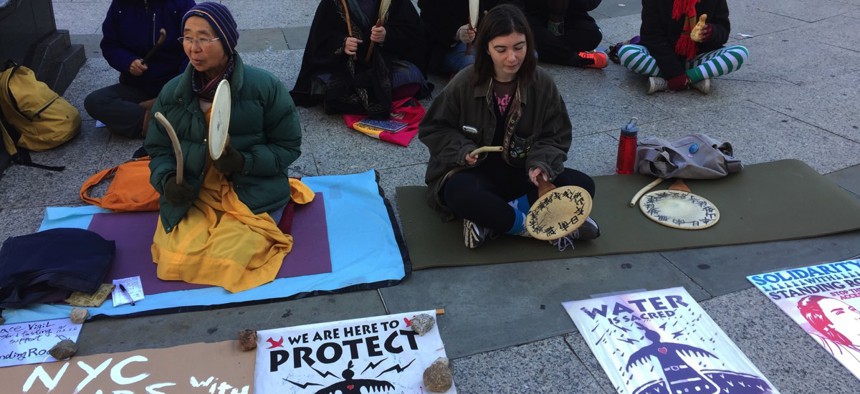North Dakota Pipeline Protesters Get a Win in Easement Denial; New York Parole Process Marred by Racial Disparities

Dakota Access Pipeline protestors in New York City in December.
Also in our State and Local Daily Digest: Oregon National Guard rented out lead-contaminated armories; mental health screening reduces Texas inmate suicides; Tennessee wildfire recovery could take decades.
PIPELINE | The four-state, $3.8 billion Dakota Access Pipeline is nearly complete, save for a section crossing under a Missouri River reservoir that the U.S. Army Corps of Engineers blocked Sunday by denying an easement. Assistant Secretary for Civil Works Jo-Ellen Darcy cited a need to “explore alternate routes” in her decision, a temporary win for the Standing Rock Sioux and their supporters arguing the pipeline threatens their water and cultural sites. North Dakota leaders in support of the pipeline, including Gov. Jack Dalrymple, are frustrated pipeline protests will now likely continue through the state’s harsh winter months. [The Bismarck Tribune]
CRIMINAL JUSTICE | A New York Times investigation into the New York State Board of Parole has found that the process for granting parole is marred by racial disparities, particularly in the cases of nonviolent small-time offenders. For example, since 2006, white inmates in prison for a single count of third-degree burglary were released after an average of 803 days. Black inmates, on average, served 883 days for the same crime. [The New York Times]
LEAD | Oregon made millions of dollars renting out National Guard armories for events like baby showers and baptisms, even though military leaders knew for years the facilities had problems with lead contamination. [The Oregonian / OregonLive]
JAIL | County jails in Texas have seen a decline in the number of inmate suicides since they began using a new mental health screening form last December. But Brandon Wood, executive director of the state’s Jail Standards Commission, stressed that the form was only one factor in play. He said: "Did it help drive the conversation? Did it require counties to become more vigilant in screening? Yes. Even after screening it still requires observation of the inmates. It requires services be provided. The form itself is only one part of the issue." [The Texas Tribune]
MARIJUANA | Only one person is known to have been cited under Memphis, Tennessee’s since-suspended ordinance allowing police to issue $50 fines for possession of a half-ounce or less of marijuana instead of up to a year in jail and a $2,500 fine under state law. Tennessee Attorney General Herbert Slatery III said the ordinance contradicted state punishments and was thus unenforceable in a non-binding opinion, prompting its suspension, but cities like Nashville have continues with less stringent citations. [The Commercial Appeal]
HOUSING | Miami’s financial district, Brickell, has seen its population roughly triple in the last 16 years to nearly 35,000 people. But rapid changes in the neighborhood are raising questions about how it will continue to develop. “Between 2003 and 2008, there was $13 billion in private investment in downtown Miami,” said Alyce Robertson, executive director of Miami’s Downtown Development Authority. “The public sector has to catch up. Nobody imagined it would grow that fast.” [Miami Herald]
WILDFIRE | Recovering from the destructive fires that ripped through Gatlinburg, Tennessee and surrounding areas last week is not expected to be a quick or easy process for communities in the area. “My first thought was, 'these guys are in for a long ride,'” said Rob Brown, an elected official from Lake County, Calif., who coordinates the response to devastating wildfires there. “It could be decades.” [The Tennessean]
HIGHER ED | South Carolina’s public colleges and universities are seeking about $1.1 billion in added funding in the state’s next budget cycle. Only a fraction of the additional spending is expected to win approval from the state’s Legislature when it convenes next year, beginning in January. [The State]





